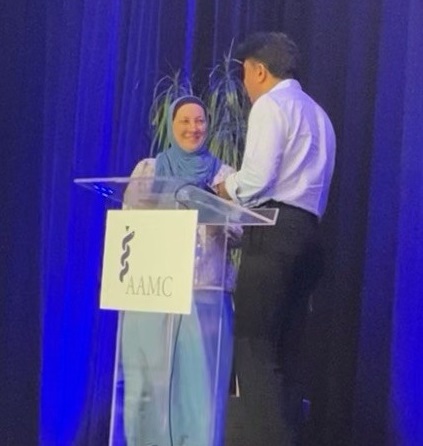An inaugural program designed to empower junior and mid‐career faculty at the Wayne State University School of Medicine is gaining national recognition.
A poster detailing the Wayne State Empowerment of Academicians In Medicine, or WE AIM, program won Best in Class in the category of Developing the Next Generation of Leaders at the 2023 Association of American Medical Colleges Group on Diversity and Inclusion and Group on Faculty Affairs Joint Professional Conference, held June 12-14 in Indian Wells, Calif.
The poster, titled “WE AIM Higher to Fly High: Wayne State Empowerment of Academicians In Medicine Faculty Development Program,” was submitted by Dena Nazer, M.D., professor of Pediatrics; Donovan Roy, Ed.D., vice dean of Diversity, Equity and Inclusion; and Basim Dubaybo, M.D., vice dean of Faculty Affairs and Professional Development.

“Receiving a national award for our WE AIM faculty development program was a tremendous honor and a testament to the hard work and dedication of our team,” Dr. Nazer said. “This recognition validates the effectiveness of our program in enhancing the skills and knowledge of faculty members, empowering them to excel in their teaching and research endeavors. It also serves as a motivation for us to continue striving for excellence and to further innovate our program, ensuring that it remains at the forefront of faculty development initiatives. We are proud to have made a significant impact on the professional growth of our faculty and look forward to continue offering our program to faculty.”
Launched last year, WE AIM is a faculty development program collaboration between the Office of Diversity and Inclusion, and the Office of Faculty Affairs and Professional Development. The program focuses on development and empowerment of underrepresented junior and mid-career level faculty, equipping them with the skills necessary for success within academic medicine.
The program is open to all faculty at the rank of assistant and associate professor, especially those who are underrepresented in medicine.
Training consisted of seven sessions held Mondays from January through June. Topics in the program’s first year included the culture of academic medicine and defining individual success, formulating a career development plan, communication and collaboration skills, improving teaching and presentation skills, preparing for promotion and tenure, grant development and administration, and strategies for successful professional writing.
The National Academy of Medicine (formerly the Institute of Medicine), Dr. Nazer noted, has advocated for institutional support to address the challenges that underrepresented faculty face in academic medicine. Underrepresented faculty in medicine are less likely to be promoted, less likely to hold senior faculty and administrative positions, and less likely to receive National Institutes of Health research awards. In addition, such faculty report lower career satisfaction and higher social isolation than faculty who are not underrepresented in medicine.
The program graduated its first cohort, consisting of 11 faculty members, June 12. Dr. Nazer said feedback from the participants was positive, with the majority rating the program “excellent and beneficial.” The graduates are recommending the program to colleagues.
The program will issue a call for applicants for its second year this summer, with courses set to begin in the fall.